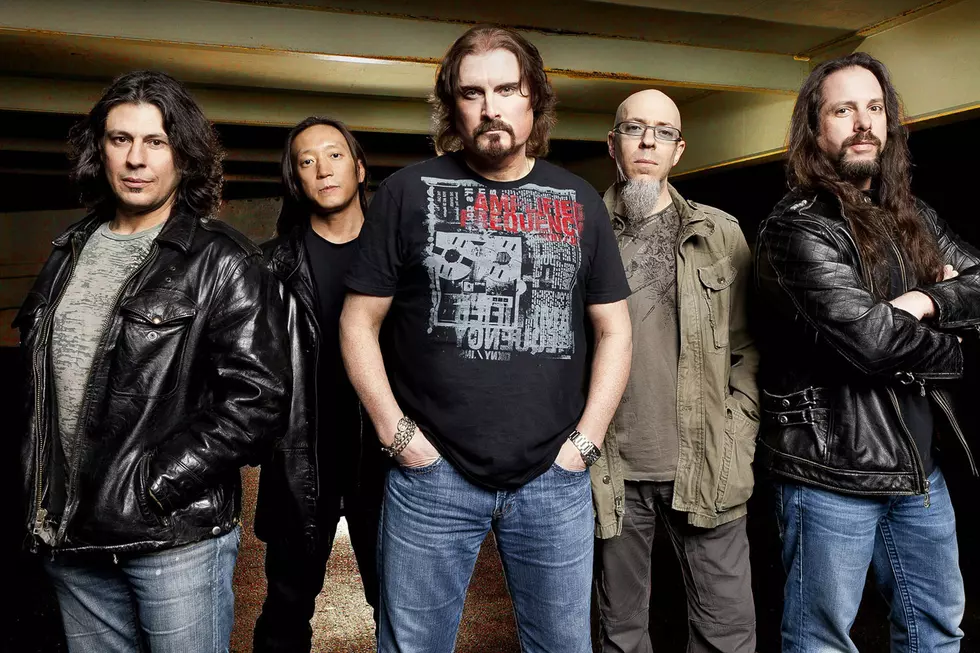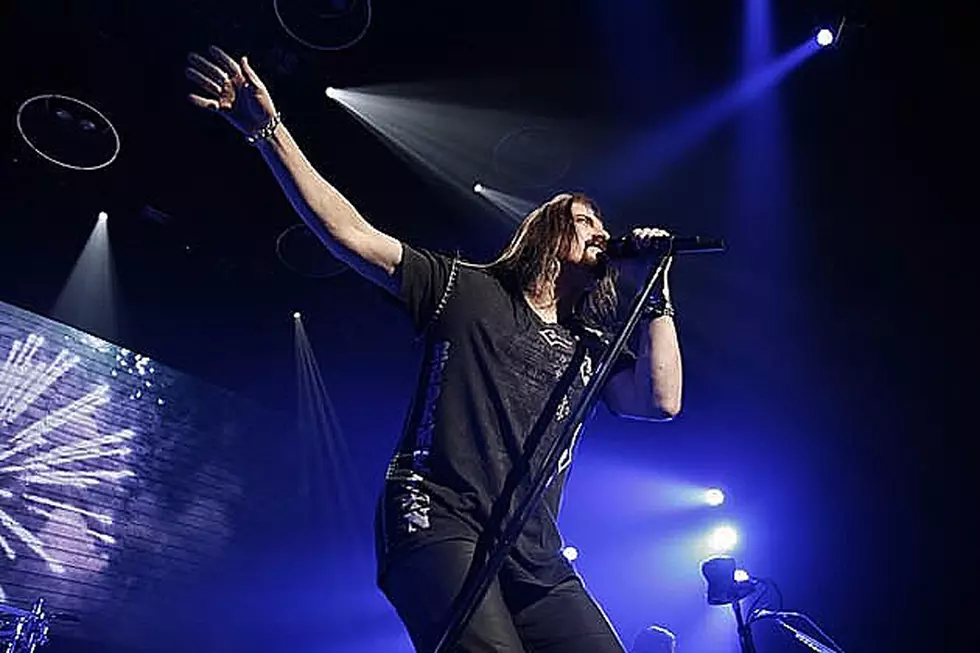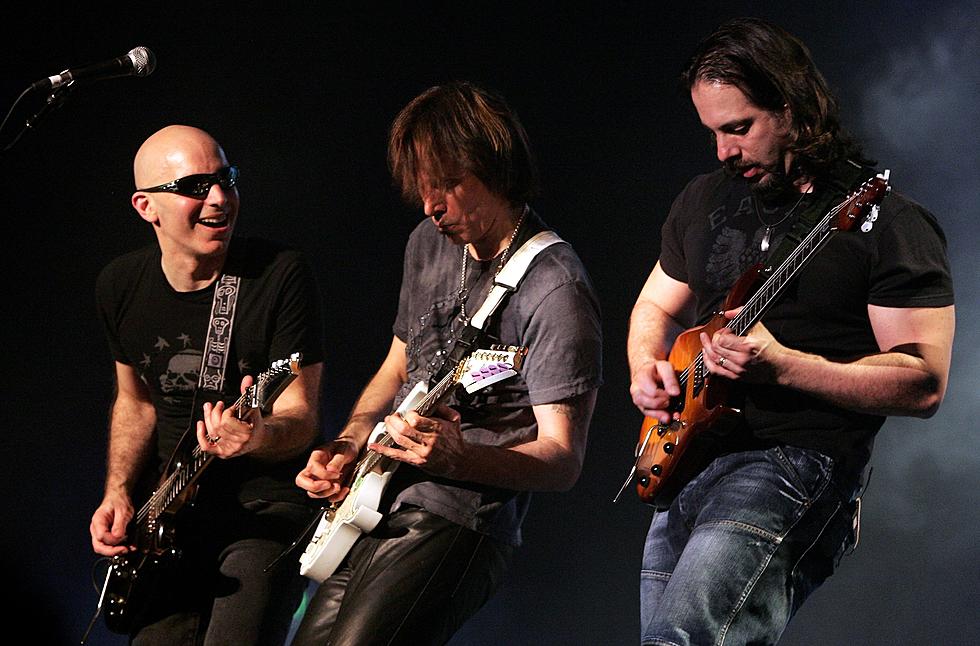
Dream Theater’s James LaBrie Talks ‘The Astonishing’ Album, Touring + More
Dream Theater frontman James LaBrie was the guest on Full Metal Jackie's weekend radio show. The singer discussed the band's current concept album, 'The Astonishing,' the touring production in support of the disc and more. Check out the chat below:
Thanks so much for being on the show. Lots to talk about with Dream Theater. You're going to be on the road for, like, a couple of months now, with the double concept album The Astonishing. Dream Theater albums are often thematic, if not outright concept albums like The Astonishing. How conscious are you about being the literal voice of characters when you sing those songs?
I'm very, very conscious of it. We haven't done a conceptual album in 16 years. Especially when I'm approaching an album like this and you're talking about the vocal part of it. I'm representing seven characters and it was an unprecedented experience for me even though I had done some opera-like or conceptual albums before, character driven being my human equation with RN Lucassen or the absolute man, Leonardo with Trent Gardner. There was some experience there, and obviously the experience from doing Scenes From a Memory and every other Dream Theater disc that's enabled me to really wrap my head around this approach. But, we always know that we're kind of like, pushing the envelope each album. This one we wanted to bring to another place that we feel that we've really transcended anything else we've done conceptually wise, previously.
James, how much did you approach your vocal performances with The Astonishing with a thespian perspective rather than a more traditional singer mindset?
With something like this, I think you're always looking at the fundamentals of singing. What are you going to be comfortable doing? What are you capable of doing? But, at the same time, I wanted to really travel down a road that I had not previously. There's never been an album where I've had to really represent seven characters. So, there was, I don't know, an orthodox approach in the sense that I knew that I was going to representing two females, and then five males. First and foremost, it was all about myself really wrapping myself around the lyrical content and immersing myself in that within each character to familiarize myself and become as close to that character, just shy of being myself. Obviously so that emotionally it would seem and sound sincere and genuine and authentic. Then, trying to figure out what kind of voice I want to use for each character so that the listener could identify. So, it was more about the inflections and nuances and textures, the textural approach I would give each character. So, it was very I'd say technical at first and then once I found the voice for each character, it was a matter of really diving into it emotionally and really painting a picture for each character so that you can relate or identify with each and every character when their moment would be upon you throughout the album.
What was most challenging for making the album for a band that regularly makes complexity seem relatively easy?
I think the biggest challenge was staying true to the story and then having the music accurately represent what the lyrics were saying at that particular time. So, in some sense because the story was already written, it enabled John Petrucci and Jordan [Rudess] to easily find the mood that was necessary to compose for that particular part of the album or moment within the album. But at the same time, the other thing we had to watch, because I think it's easier for Dream Theater, the complexities and technical aspects of the band, it's easier for us to go off on a tangent and really dive into something and before we know it, we've constructed a 12-minute track piece.
With this, it had to be more concise. It had to really not overstay its welcome. Not go beyond what was absolutely necessary for that part or that character for what needed to be said and there was an amount of time that was being given, so that's why it ended up being at least - well, 34 tracks, six of them being instrumental or interludes and then 28 being vocally driven pieces. If you think about it, the average song on this album is around four minutes. I think the longest track is just over seven minutes. For Dream Theater, that's something that really hasn't been ever done. Especially with that many tracks to be included. We've never released an album with 34 tracks, or I should say a double album. It's the most tracks we've ever released and it's the most tracks I think we've released being under five minutes on one release. It was definitely a different approach. It was much more concise, and much more focused that we knew in order for this to translate properly and be seamless and be the kind of experience we wanted the listener to have and hold their attention it had to go and it had to be done and composed as such.
You're going to be performing the full album on tour. John Petrucci has described the stage production as elaborate, almost like a Broadway show rather than a concert. What's most appealing about that to you?
Once everyone has had the opportunity to be able to listen to the album from beginning to end, they'll realize that it lends itself - it's very cinematic. It's almost a movie soundtrack, so because of that and because of the theatrical nature of it as well, we just knew that it had to be a very visually driven experience for our fans, for the audience. Because of that, once everyone sees this, they're going to see that the imagery and the visual aspects of the show, along with the incredible lighting design are really going to push the story that much more. It'll be that much more clearly read and understood but will be a thrilling ride at the same time, it'll be visually spectacular, we feel. I look at it as being an elaborate theatrical rock opera kind of experience for the audience. Just very visual. Not to the point where it distracts from us being on stage, because you can easily get lost in that type of production as well. You have to balance it, you have to watch both those environments that one doesn't overtake the other.
What was most different about the way you went about making The Astonishing compared to making the last concept album Scenes From a Memory?
I guess there were a few things. One, the fact that one person wrote the story. One person wrote the lyrics. Two people, Jordan and John Petrucci, wrote all the music. So that in itself made it for a different experience. And then, sitting down with John and Jordan, going through the melodies to make sure that everything was exactly where it needed to be to be the most powerful representation melodically. That was priority, not that it isn't on every album, but definitely on this album. If the melodies were not something that resonated or something that really held its own, almost like in acoustic setting you can hear these melodies being sung and you'd be drawn by them. You'd be captivated by them. We wanted them to be that powerful and that strong. So, that sitting down and making absolutely sure that once the vocals and the melodies were done that it would be undeniable. I think that's what was achieved on this.
Beyond that is what I was saying earlier, which is really being able to wrap my head around representing seven characters. I can't really change my voice, but I can in the way that I present each character through its inflection or nuances, texture. It was really having to say OK yeah set the mic up and let's go for it and here I go. I'm just going to wail. I remember, for an example, I was singing a song that included faith and with the music, I'd hear the music and I'd say well I can easily see that if I wasn't representing a female and what she's trying to say in this particular moment, I could have really gone for it. Like, I could have been a much more bombastic or I could have had a rasp or a guttural approach to this melody to support it. But, because I'm representing a female in this particular moment, then I have to rethink this. I can't just go for it and let what comes out come out. I have to think it through and that was, throughout the album from beginning to end, really having to dissect each and every thing. Almost clinical but not going so far that it became clinical and lifeless, emotionless. It was really, just thinking every step of the way and listening back and making sure that everything was hitting the way that it needed too.
When you produce something like this, you're always on the precipice of falling off and going into a land where it's somewhat cheaper, cheesy so to speak [laughs]. You really have to watch that, so you are walking a tightrope and it just has to be at the end, believable. It can't feel forced, it can't feel exaggerated. Anything like that would be detrimental to the outcome.
Looks like you've got tour dates through the beginning of May. What can we expect beyond that?
There's talk that we'll be going back to Europe to do a festival tour sometime throughout June. Then, I do believe we might be breaking for a bit through July and August and then back September I think we'd be going to Asia and through the Pacific Rim, hopefully to places like India and that region of the world. Then, obviously South America and possibly coming back through North America and then we'll take it from there. Pretty much bringing ourselves right back around to this time next year by then.
You'll be busy, [laughs].
It's always been very extensive, our world tours. We want to make sure we get into every possible place. We don't always necessarily obtain it just because of schedule conflicts or whatever or if there's some unrest in certain parts of the world, we unfortunately can't get over there, we just don't think it's a good idea to do so. That's very unfortunate too but it does usually take 14 months to complete a tour.
I wish you the best of luck.
Great, thank you Jackie.
Thanks to Dream Theater's James LaBrie for the interview. 'The Astonishing' is currently available via Amazon and iTunes. Look for Dream Theater on tour at these stops. Find out where you can hear Full Metal Jackie’s weekend show at this location.
See Which Dream Theater Albums Landed on the Top 90 Hard Rock + Metal Albums of the 1990s
You Think You Know Dream Theater?
More From Q 105.7










